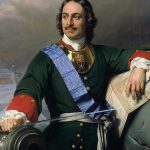Pius XI was born in 1857 and was Pope from 1922 for eighteen years, during which he inadvertently caused the collapse of the Catholic Popular Party. He did not like the idea of mixing religion with politics anyway, and spoke out against such an idea. He saw the CPP as far too radical in its views, and forbade it utterly to form alliances with any other parties who wished to oppose the rise of Benito Mussolini. For this he was seen by all as a supporter of the Italian leader.
Probably he cemented this adverse opinion of him by signing the Lateran Treaties with the dictator in 1929, thus ending the dispute between Church and State (only in Italy). With this move-on-the-board he took Italy backwards to its unification of 1860.
Having, perhaps without intention, established himself as a supporter of Fascism, he protested against what he described as the ‘pagan worship’ of the State by Fascists, and actually dared to disagree with Il Duce (q.v.) when the latter started his anti-Semitic campaign in 1938. Now we come to the bit which fascinates and repels modern historians. Pius XI assisted strongly by Cardinal Pacelli (later to be Pope Pius XII) made a Concordat with Adolf Hitler in 1933, the year of the latter’s election as Chancellor. Europe and America clearly saw him as a Pope who admired both Mussolini and Hitler, which gave him a very bad press.
I937 however saw his publication of the encyclical With Deep Anxiety in protest against Nazi violations of human rights. Not content with this blast, Pius XI accused the Nazis directly of ignoring the terms of the Concordat, in the terms of which the Catholic Church was assured of freedom for bishops to communicate with the Pope, and permitted religious orders (monasteries and convents and their occupants) to continue their pastoral work. In return the Church ordered bishops to take an oath of loyalty to the State, agreed to disassemble Christian trade unions, and made priests refuse to join any political party. Pope Pius died in 1939, aghast at the prospect of a second world conflict which to a small extent and without clear intention, he had helped to create.
Pius XII was born a patrician Pacelli in Rome in 1876. In 1899 at twenty-three he was ordained priest and was in the Vatican administration by 1901. Like many other high churchmen, he was an excellent linguist, speaking and writing in a great diversity of languages. This talent helped him as a clever diplomat during a longish period as Papal Nuncio (ambassador) in Germany from 1917 to 1929.
He became a cardinal in 1929 at the age of fifty-three and was recalled to Rome to become Papal Secretary of State, the highest post in the Church after that of the Pope. In close association with Pius XI (see above) he organised the Concordat. Pacelli persuaded the Catholic Centre Party to vote for an Enabling Act which gave dictator’s powers to Hitler, as well as forcing the party to disband itself. Unsurprisingly, the world’s press disapproved.
Pacelli became Pope in March, 1939 and mysteriously commended France on ‘a great Catholic victory in Spain. As Pope he wrote a letter to Hitler expressing his wish for friendly relations between Church and State, but did not criticise Germany’s invasion of Poland. He did not, however, hesitate to condemn the Soviet invasion of Finland. He insisted, he said, on ‘the most conscientious impartiality’; he added that this did not mean ‘insensitivity and silence where moral and human considerations demanded an open word’: having said that, he remained silent on the subject of the Nazi concentration camps, though he was fully informed about them.
When begged to, he refused to excommunicate Catholics whom he knew were taking part in ‘The Final Solution’.
When the Ustase started its murderous campaign in Croatia against Serbs, Jews and Gypsies he dismissed the stories as ‘calumnies’, gave his blessing to Ustase delegates in Rome, and when they were defeated gave them false passports to help them escape the South America. Historians tell us Pius XII did the same for such choice creatures as Dr Mengele, Eichmann, and Franz Stangl, overall commander of Treblinka. It can come as no surprise to the reader that this Pope did not enjoy popularity with the world’s free press.
Apologists for Pius XII claim that he behaved in this manner because he was afraid of reprisals against Roman Catholics in general, and might lose the loyalty of the German Catholics in particular. Nevertheless, he was right when he said that Communism was a far worse danger to the world than Nazism. In 1949, four years after the end of the Second War, he excommunicated all Catholics who happened to be members of the Communist Party. He died as one of the most unpopular Popes in history, in 1958. He was eighty-two.









Leave A Comment